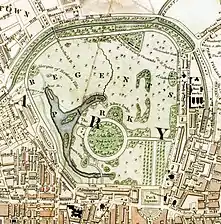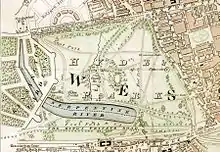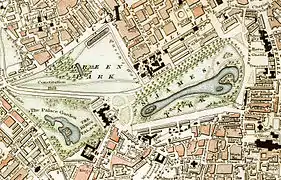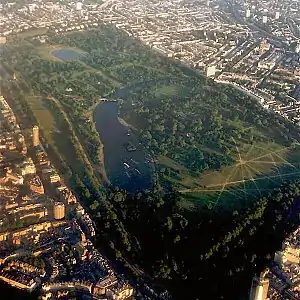Royal Parks of London
The Royal Parks of London are lands originally owned by the monarchy of the United Kingdom for the recreation, mostly hunting, of the royal family.[1] They are part of the hereditary possessions of The Crown.



Parks
With increasing urbanisation of London, some of these were preserved as freely accessible open space and became public parks with the introduction of the Crown Lands Act 1851. There are today eight parks formally described by this name and they cover almost 2,000 hectares (4,900 acres) of land in Greater London.
- Bushy Park, 445 hectares (1,100 acres)[2]
- Green Park, 19 hectares (47 acres)[3]
- Greenwich Park, 74 hectares (180 acres)[4]
- Hyde Park, 142 hectares (350 acres)[5]
- Kensington Gardens, 111 hectares (270 acres)[6]
- Regent's Park, 166 hectares (410 acres)[7]
- Richmond Park, 955 hectares[8][9] (2,360 acres (9.6 km2))
- St. James's Park, 23 hectares (57 acres)[10]
Of these, Regent's Park, Hyde Park and Kensington Gardens (which are adjacent), Green Park and St James's Park (also close to each other) are the largest green spaces in central London. Bushy Park, Greenwich Park and Richmond Park are in the outer boroughs.
The Royal Parks agency also manages other open spaces: the Brompton Cemetery, Grosvenor Square Gardens, Victoria Tower Gardens and the gardens of 10, 11 and 12 Downing Street.[11] Hampton Court Park is also a royal park within Greater London, but as it contains a palace, it is administered by the Historic Royal Palaces, unlike the eight Royal Parks.[12]
Legal position
The public does not have any legal right to use the parks, as public access depends on the grace and favour of the Crown, although there are public rights of way across the land. Until 2017, the Royal Parks Agency managed the Royal Parks under powers derived from section 22 of the Crown Lands Act 1851. As part of its statutory management function the agency permitted the public to use the parks for recreational purposes, subject to regulations issued under the Parks Regulation Acts 1872–1926 which were considered necessary to secure proper management, preserve order and prevent abuse within the parks. The Royal Parks and Other Open Spaces Regulations 1997 then came into effect until a separate charity took over the parks from the Royal Parks Agency.[13]
Management
The parks were managed by the Royal Parks Agency (an executive agency of the Department for Culture, Media and Sport) until the agency joined with charity the Royal Parks Foundation to form a new charity – The Royal Parks – launched in July 2017. The parks are policed by the Royal Parks Operational Command Unit of the Metropolitan Police (the English section of the previous force policing the parks, the Royal Parks Constabulary, has been abolished). Some funding for the Royal Parks comes from a central government grant. This contrasts with most of London's other parks, which are funded by local borough councils. The Royal Parks charity generates the majority of its income from commercial activities such as catering and staging public events such as concerts.
Mayoral control
In 2010, Mayor of London Boris Johnson proposed that control over the Royal Parks should be devolved to the Greater London Authority[14] and the government put forward proposals for that to happen later on that year.[15] The plan was welcomed by Royal Parks but not implemented.[16]
References
- Thurston, Hazel. Royal Parks for the People: London's Ten. UK and USA: David and Charles. Vancouver: Douglas, David and Charles. 1974. ISBN 0-7153-6454-5. Includes listing of the Parks with black-and-white photographic plates.
- "Bushy Park". The Royal Parks. Archived from the original on 19 May 2011.
- "Green Park". The Royal Parks. Archived from the original on 1 February 2010.
- "Grenwich Park". The Royal Parks. Archived from the original on 19 May 2011.
- "Hyde Park". The Royal Parks.
- "Kensington Gardens". The Royal Parks. Archived from the original on 19 May 2011.
- "Regents Park". The Royal Parks. Archived from the original on 16 May 2010.
- "Written answer to the House of Commons from the Head of the Royal Parks Service". Publications.parliament.uk. 7 February 2002.
- "Hansard: Royal Parks". Archived from the original on 29 June 2011. Retrieved 8 June 2011.
- "Brompton Cemetery". The Royal Parks. Archived from the original on 7 October 2009.
- "What we do". The Royal Parks.
- Richmond Borough Council Archived 26 August 2015 at the Wayback Machine
- "Who we are". The Royal Parks.
- Mayor's Proposals for Devolution Archived 26 November 2010 at the Wayback Machine
- "Responsibility for London's Royal Parks to pass to London's Mayor". culture.gov.uk.
- Royal Parks sees merger with the mayor's office as opportunity to boost sponsorship
